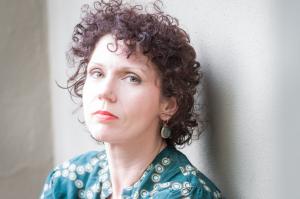 Hausfrau is the first novel by acclaimed American poet Jill Alexander Essbaum and I was fortunate enough to read it six months ago, knowing only that its UK publishers at Mantel were very excited about it. As anyone who runs a literary blog knows, it’s a publisher’s job to be excited about the titles they release – sometimes I can see what the fuss is about, sometimes not. From the moment I started reading Hausfrau, I could totally see it and it is one of my Fiction Hot Picks 2015. By coincidence, I found several of the themes of the novel I was working on to be prevalent here: ex-pat life in a European country, infidelity, female sexuality – and also motherhood, mental health and some interesting philosophical questions. Jill’s novel has a strong base in her personal experience of living in Switzerland and I am delighted that she joins me to talk about that (my mini-review follows):
Hausfrau is the first novel by acclaimed American poet Jill Alexander Essbaum and I was fortunate enough to read it six months ago, knowing only that its UK publishers at Mantel were very excited about it. As anyone who runs a literary blog knows, it’s a publisher’s job to be excited about the titles they release – sometimes I can see what the fuss is about, sometimes not. From the moment I started reading Hausfrau, I could totally see it and it is one of my Fiction Hot Picks 2015. By coincidence, I found several of the themes of the novel I was working on to be prevalent here: ex-pat life in a European country, infidelity, female sexuality – and also motherhood, mental health and some interesting philosophical questions. Jill’s novel has a strong base in her personal experience of living in Switzerland and I am delighted that she joins me to talk about that (my mini-review follows):
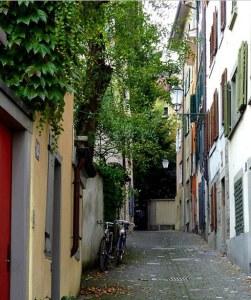
To be sure, it’s a narrative choice. The book really does turn on an outsider’s understanding of Switzerland’s insularity. Of course, every country has its own expatriate experience, that’s not in dispute. But Zürich’s is particular in that all difficulties are played out against a backdrop so stunning and pristine it seems slap-in-the-face ungrateful to whimper about anything at all. Therefore I stutter-stepped through my depictions so that my protagonist’s quotidian despair might be held up against an equally ubiquitous beauty and through this tension, her alienation might be all the more keenly felt.
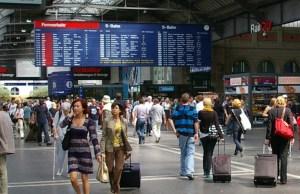
If you visit the city— and I hope you will— there’s a given list of must-see tourist stops you’d be foolish to miss: Grossmünster, St. Peter’s Kirche, the Lindenhof, the Swiss National Museum, Uetliberg, Altstadt. Every tour book will take you to these sites. But set those aside. I have suggestions of my own. There’s a forest between Effretikon and Wangen that’s worth getting lost inside of, so green and unpopulated it is. It’s near the geographic center of the Kanton. A stone marker notes the spot. And there’s a chicken franchise called Güggeli Express with a fleet of vans equipped with roasters that park in various towns on scheduled days. It’s the best damn bird you’ll ever eat.
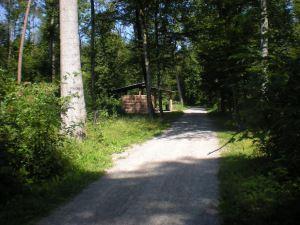
Or, go to Lake Zürich and travel south down Seefeldquai towards those strange sheep sculptures on the open lawn by the boat docks. On your far left you’ll see a concrete slab hidden back away from the sidewalk. Once, I sat there for an hour and penned the saddest letter I ever wrote which, according to the intended recipient, never arrived.
And if you find yourself in Dietlikon— where Hausfrau happens to be set— there’s a path just north of town that crawls up a slow, sloping hill. It wends through summer farm fields. It crooks around an abandoned barn marked with illegible graffiti. At the crest of the hill, before the forest, there is a bench. It is the bench where I used to go and sit and think and pray and cry and yearn. It is a good bench. There is consolation there. Go visit it.
Thank you to Jill for this beautiful and unusually intimate travelogue. I must go to Zürich…
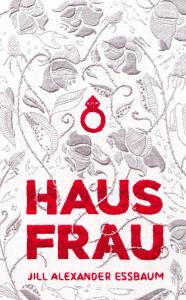
Hausfrau is a brave and arresting novel where there’s a lot going on. For a start there’s a lot of sex, frankly related; whether the reader finds it erotic is a personal matter but titillating or romantic it is not. Like everything about Anna’s behavior her serial infidelity is a consequence of her depression and alienation. These may not sound like the most promising ingredients for a novel but despite its bleakness this one grabbed me hard, leaving a lasting impression. I applaud the author for kicking against the pressure (women) writers face to make female characters nice and empathetic – and the frequent assumption that (women) readers can’t or are not willing to relate to protagonists who aren’t. If Anna’s passivity and lack of anything very tangible to complain about (as a mother of three young children she has an enviable – one might say convenient – amount of freedom, thanks to an accommodating if begrudging mother-in-law) construct a barrier for the reader, this is also precisely where the fascination lies. Clues to her psychological make-up are sparsely sown and in her Jungian therapy sessions Anna is as inclined to ask questions as to be shown answering them. Against the odds, it is hugely compelling stuff. The prose has a luminous beauty, no surprise from a poet but strangely, in view of my interests, I wasn’t sold on the recurrent German-grammar-as-life motif. There’s far more to say about this novel than space permits – it begs to be discussed. My book group are now reading it and something tells me we’re in for a late night.
Author photo © Megan Sembera Peters
*POSTSCRIPT*
Next week there will be yet another fantastic Writers on Location post from Christopher Bollen, author of ORIENT which is also one of my Hot Picks 2015. Come back then to discover the secrets of Long Island…
OPEN SOFA…
Do YOU fancy appearing on the Literary Sofa? As things have been too frantic to take a break, I’m going to hand the Sofa over to volunteers for a few weeks from late April whilst I prepare my Summer Reads selection. If you’re any kind of writer (up-and-coming, self-published, world famous) or publishing professional with something interesting to say that hasn’t been said on here before and you’re interested in sharing some top quality content with my readers, do get in touch via the Comments or on Twitter @isabelcostello.

